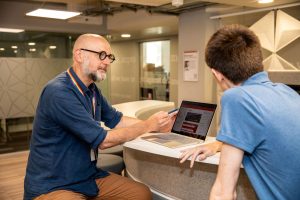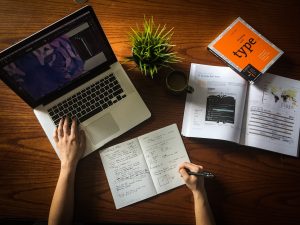
Happy New Year and welcome to the Spring term. Our Library teams look forward to continuing to support you with your studies.
If you’re a January starter, we recommend that you look at our top recommendations in the Information for new students LibGuide. If you’re returning to Campus, we’d like to share the following reminders on how to make the most of the services, resources and facilities.
Support with your studies
Do you need help with an aspect of your studies? Your Academic Liaison Librarian and the Study Advisors will be happy to assist. Take a look at the Training and workshops webpage for more information, links to guides, training materials and more!
Study areas
Study space is available on all floors of the Library, including individual silent study on the 5th Floor. If you are using this study area, please remember that it is entirely silent so you may prefer to use the individual quiet study areas, located on all other floors, or the range of group study spaces.
‘Want to know more?
Please note: you may find it useful to familiarise yourself with other locations as, at peak times, you may need to find alternative study space. We are currently operating at a slightly reduced study space capacity due to the increased need for ventilation within the building. This provision is aligned with University health and safety guidance.
Stay safe
If you are using study space in the Library, help us to keep open and stay safe by:
- Not moving furniture – study areas have been specifically configured to comply with capacity allowances in relation to ventilation requirements.
- Keeping windows open, on ventilation mode, if studying in a space next to a window.
- Wearing a face covering (unless you are exempt) when using the Library.
Masks and other face coverings should cover the nose and the mouth and should remain in place at all times.
- Following the one-way systems, using the sanitisation stations and not using the lifts in groups.
Single occupancy of lifts and other measures are all still in place so please refresh your knowledge of our Covid-19 safety information. Look out for our signage and notices displayed throughout the building to assist you.
- Not eating in the Library.
Help us to keep the building clean, safe and tidy by eating in the Library Café or other suitable spaces on campus. Please do not bring hot food into the Library at any time as this creates unpleasant smells, and is disruptive for other Library users.
- Using lidded containers, when bringing drinks into the Library.
Non-alcoholic hot and cold drinks are permitted – we have recycling facilities for single use cups and plastic bottles.
Visiting the Library between midnight and 8:00? Remember to bring your campus card for entry via the keypad next to the right hand side entry door.
Recalled items
The Library is a shared resource, so please look out for our recall emails and courtesy reminders. If someone places a hold on an item that you have out, a recall notice will be sent to your University email account. Recalled items must be returned so that other users needing a particular book can gain access. If you still need the item, simply place a request once it has been returned so that the next available copy can be held for you. Further information on recalls can be found here.
Opening hours
24/6+ opening hours resumed on Sunday 9 January – full details of the opening hours may be found here.
Do you follow us on social media? If not, this may be the perfect time to begin so that you can stay up to date and make the most of your Library!

Your Library Team



 Wondering about how to start researching and writing your Masters dissertation or project? Why not book onto the
Wondering about how to start researching and writing your Masters dissertation or project? Why not book onto the 



 We are offering additional online workshops on using EndNote and Mendeley to follow on from the EndNote / Mendeley comparison webinar which is taking place as part of the
We are offering additional online workshops on using EndNote and Mendeley to follow on from the EndNote / Mendeley comparison webinar which is taking place as part of the  Working from home? Need guidance on accessing the material you need for your dissertation? Then sign up for one of our sessions run by your Academic Liaison Librarians.
Working from home? Need guidance on accessing the material you need for your dissertation? Then sign up for one of our sessions run by your Academic Liaison Librarians. Have you been marked down for inconsistencies in referencing? Are you fed up with writing all of your references by hand? There are programs that can take the pain out of referencing by storing your references and helping you create bibliographies in Microsoft Word.
Have you been marked down for inconsistencies in referencing? Are you fed up with writing all of your references by hand? There are programs that can take the pain out of referencing by storing your references and helping you create bibliographies in Microsoft Word. Following on from our successful Masters Dissertation Fair we are offering extra EndNote and Mendeley workshops to support students wanting to learn how to use these reference management tools. These will take place online via Blackboard Collaborate at the following times:
Following on from our successful Masters Dissertation Fair we are offering extra EndNote and Mendeley workshops to support students wanting to learn how to use these reference management tools. These will take place online via Blackboard Collaborate at the following times: There are still places available on our final reference management system workshops for EndNote and Mendeley this term. These will take place online via Blackboard Collaborate.
There are still places available on our final reference management system workshops for EndNote and Mendeley this term. These will take place online via Blackboard Collaborate. This time of year, we know many of you are busy preparing for exams or working on those dissertations. Why not take a moment to check out the advice and support that we have on offer; it could save you time in the long run!
This time of year, we know many of you are busy preparing for exams or working on those dissertations. Why not take a moment to check out the advice and support that we have on offer; it could save you time in the long run!